|
|
|
Sort Order |
|
|
|
Items / Page
|
|
|
|
|
|
|
| Srl | Item |
| 1 |
ID:
090141
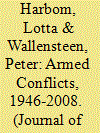

|
|
|
|
|
| Publication |
2009.
|
| Summary/Abstract |
In 2008, the number of active armed conflicts was 36, up by one from 2007. Over the past few years, the number of active conflicts has not seen any drastic changes from one year to the next. However, the number of armed conflicts has increased by nearly one-quarter since 2003, which was the year with the lowest number of active armed conflicts since the 1970s. While the number of conflicts continued to increase, the number of wars (i.e. conflicts with over 1,000 battle-related deaths) remained at a very low level, with only five recorded for 2008. Four conflicts listed in 2007 were no longer active in 2008, but during the year, two conflicts were restarted by previously recorded actors (in Burundi and in Georgia). Furthermore, three new conflicts erupted, one of which was fought between states (Djibouti-Eritrea). Thus, the record-long four-year interlude 2004-07 with no interstate conflict was broken.
|
|
|
|
|
|
|
|
|
|
|
|
|
|
|
|
| 2 |
ID:
090139
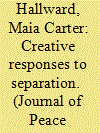

|
|
|
|
|
| Publication |
2009.
|
| Summary/Abstract |
This article examines creative ways in which Israeli and Palestinian activists engage with each other and the powers seeking to separate them in their nonviolent struggles for a just and lasting peace. Using the geopolitical theory of territoriality, the article briefly examines a number of administrative, physical, and psychological barriers facing joint activism and the strategies activists use to counteract them. Drawing on nonviolent theory and practice, the article analyzes how activists exert power through the creative use of symbols and practices that undermine the legitimacy of occupation policies. Based on fieldwork conducted in 2004-05 and July 2006, the article explores the implications of this activism on conceptions of identity, and strategies for restarting a moribund peace process. The relative `success' of sustained joint action in Bil'in can provide scholars and policymakers with innovative approaches for addressing some of the outstanding issues needing to be addressed by official negotiators. Although government bodies are more constrained than activists, the imaginative means of engaging with the system - and the reframing of issues through the redeployment of `commonplaces' - can perhaps provide inspiration, if not leverage, for thinking outside of the box.
|
|
|
|
|
|
|
|
|
|
|
|
|
|
|
|
| 3 |
ID:
090136
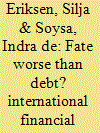

|
|
|
|
|
| Publication |
2009.
|
| Summary/Abstract |
Some report that human rights are likely to be violated when poor countries sign up to structural adjustment programmes (SAPs). These violations apparently occur because ordinary people revolt against the neo-liberal policies that SAPs push. This study examines the effect of the actual flow of finances from the World Bank and the IMF, holding constant all other bank-based financial flows, on government respect for human rights. The authors find that pay-in periods are beneficial for human rights, whereas loan dry-ups correlate with violations. Loan dry-ups are likely to occur because of noncompliance with SAPs rather than implementation, since the international financial institutions (IFIs) release loans in tranches to solve the time inconsistency problem. The overall level of indebtedness is robustly related to human rights abuses, but the higher the stock of debt owed to IFIs relative to total debt, the lower the human rights violations. Accumulating debt to IFIs, thus, seems to improve the level of human rights. Additionally, a higher government consumption to GDP ratio reduces human rights, a result that does not suggest that governments that are capable of commanding a higher share of the country's wealth are less likely to face threatening social dissent. Moreover, a proxy for neo-liberal policies, the index of economic freedom, correlates strongly with better human rights. These results do not square well with the view that neo-liberal policy reforms and the attendant austerity measures drive dangerous dissent.
|
|
|
|
|
|
|
|
|
|
|
|
|
|
|
|
| 4 |
ID:
090137
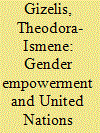

|
|
|
|
|
| Publication |
2009.
|
| Summary/Abstract |
Previous studies have suggested that societies where women have higher social and economic status and greater political representation are less likely to become involved in conflict. In this article, the author argues that the prospects for successful post-conflict peacebuilding under the auspices of the United Nations (UN) are generally better in societies where women have greater levels of empowerment. Women's status in a society reflects the existence of multiple social networks and domestic capacity not captured by purely economic measures of development such as GDP per capita. In societies where women have relatively higher status, women have more opportunities to express a voice in the peacemaking process and to elicit broader domestic participation in externally led peacekeeping operations. This higher level of participation in turn implies that UN Peacekeeping operations can tap into great social capital and have better prospects for success. An empirical analysis of post-conflict cases with a high risk of conflict recurrence shows that UN peacekeeping operations have been significantly more effective in societies in which women have relatively higher status. By contrast, UN peacekeeping operations in countries where women have comparatively lower social status are much less likely to succeed.
|
|
|
|
|
|
|
|
|
|
|
|
|
|
|
|
| 5 |
ID:
090142
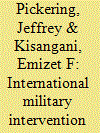

|
|
|
|
|
| Publication |
2009.
|
| Summary/Abstract |
As major wars have become uncommon over recent decades and the efficacy of economic sanctions is questioned, foreign military intervention seems to have become increasingly prevalent on the international scene. Military intervention has also gained a degree of moral legitimacy, as it is now often launched for humanitarian ends rather than simply to further the intervener's strategic or material interests. Despite the apparent increase in the use of foreign military intervention as a policy tool in recent years, the quantitative international conflict literature continues to operate without either a comprehensive or a current inventory of foreign military interventions. The authors attempt to fill this gap by updating Pearson & Baumann's International Military Intervention (IMI) dataset from 1989 to 2005. IMI has a number of attributes that should make it attractive to quantitative international conflict scholars. One is that it is one of a small handful of interstate conflict datasets that attempts to discern the motives behind state uses of force. Also, its substantive coverage is broad, allowing researchers to separate out and focus on the forms of intervention (supportive, hostile, humanitarian, territorial, etc.) that are relevant to their research. As a preliminary validity test of the updated data, the authors analyze patterns of Cold War and post-Cold War military intervention in the IMI collection to see if they correspond with conventional wisdom on real world events.
|
|
|
|
|
|
|
|
|
|
|
|
|
|
|
|
| 6 |
ID:
090135


|
|
|
|
|
| Publication |
2009.
|
| Summary/Abstract |
The effects of defense spending on economic performance and, in particular, on economic growth have been studied extensively in the literature. The empirical findings have been ambiguous so far, partly reflecting the econometric difficulties involved in the estimation of this relationship. The authors study the implications of Swiss defense spending for economic growth and unemployment in Switzerland, using both national aggregate and cross-sectional (cantonal) data. Such analysis may be more informative than similar analyses that rely on time series for individual countries (due to spurious time effects) or averages for different countries (due to strong cross country variation in country characteristics). The findings indicate that although defense spending has had a positive effect on the rate of economic growth of Switzerland in the presence of an external threat (Cold War), the distribution of defense spending across cantons has not contributed to the dispersion of cantonal growth rates. Nonetheless, cantons in which military employment is a large share of total employment have enjoyed lower and more stable unemployment rates. These findings suggest that in order to uncover the full implications of defense spending, it is necessary to go beyond the defense spending-growth nexus. The findings seem relevant for many other countries because the allocation of national defense employment and spending is rarely uniform across the regions of any country.
|
|
|
|
|
|
|
|
|
|
|
|
|
|
|
|
| 7 |
ID:
090140
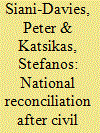

|
|
|
|
|
| Publication |
2009.
|
| Summary/Abstract |
This article discusses post-conflict reconciliation in Greece following the divisive civil war of the 1940s. Focusing on the elite political discourse and the relationship between reconciliation and democratization, its chief argument is that in Greece continuing disagreement about the civil war did not inhibit a process of reconciliation because it was voiced within a normative framework in which violence had been repudiated as a political tool. Particularly since the fall of the Colonels' dictatorship in 1974, reconciliation has been linked to a number of distinct political projects, some of which were as divisive as conciliatory in their effect. In each case, reconciliation meant different things to differing shades of political opinion, but the widespread adoption of the term by both the governing and opposition elites, as well as society as a whole, gradually entrapped politicians of all persuasions into accepting that a process of reconciliation had occurred. Reconciliation in Greece has therefore rested not on the establishment of a single agreed narrative representing the truth about the past, but rather on the righting of perceived injustices and the free articulation of differing interpretations of that past by both left and right within a democratic environment.
|
|
|
|
|
|
|
|
|
|
|
|
|
|
|
|
| 8 |
ID:
090138
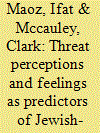

|
|
|
|
|
| Publication |
2009.
|
| Summary/Abstract |
A representative sample of Israeli Jews (N = 504) completed a survey assessing attitudes towards compromise in the Israeli-Palestinian conflict. Support for compromise was well predicted (R = .63) by a combination of four scales: perception of collective threat from Palestinians, perception of zero-sum relations between Palestinians and Israelis, personal fear of Palestinians, and sympathy towards Palestinians. Feelings of hostility towards Palestinians did not make an independent contribution to this prediction. As hypothesized, respondents who perceived high collective threat and zero-sum relations were much less supportive of making concessions to Palestinians. However, respondents who indicated feeling personal fear were in regression analysis slightly more supportive of compromise. Sympathy toward Palestinians was associated with more support for compromise. Additionally, religiosity was strongly associated with decreased support for compromise. However, entering threat perceptions and sympathy into the equation substantially reduced the predictive value of religiosity, indicating that psychological mechanisms underlie, at least in part, the tendency of more religious respondents to show less support for making concessions to Palestinians.
|
|
|
|
|
|
|
|
|
|
|
|
|
|
|
|
|
|
|
|
|